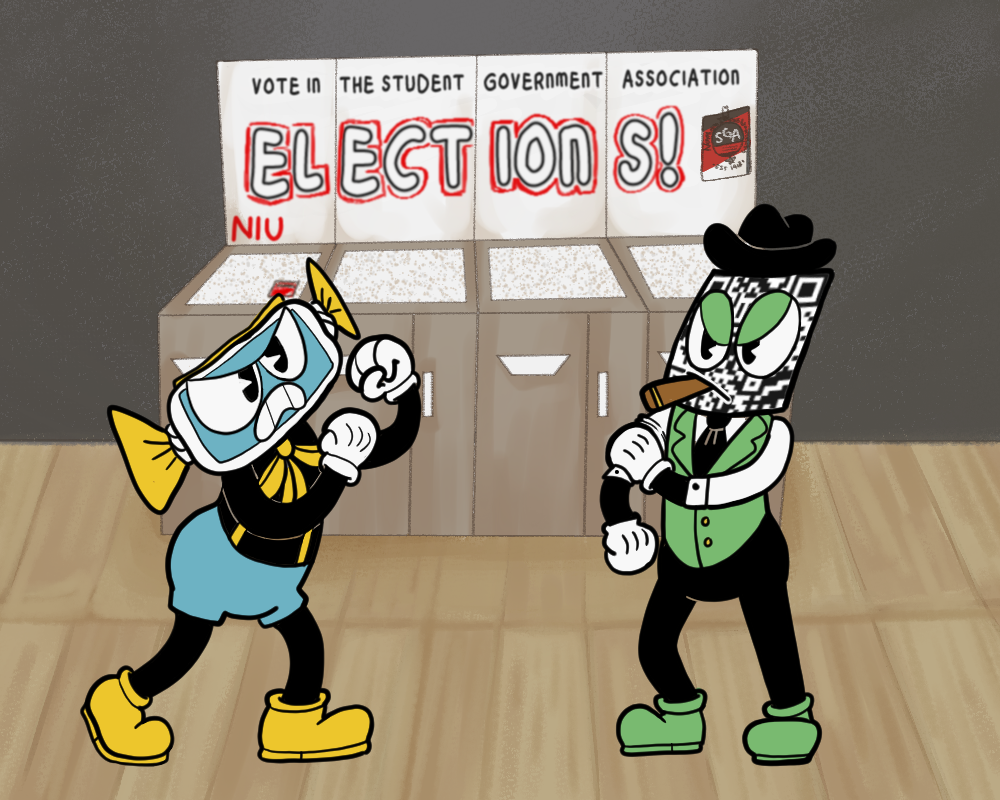While last week’s Student Government Association elections witnessed a record-breaking number of votes, the SGA elections last week were disappointingly unprofessional.
Even if national politicians often act careless and childish, SGA should hold itself to higher standards and strive for respectful conduct. We’re closer to childhood than most politicians, but we’re still adults, and an SGA election shouldn’t resemble a playground rivalry.
Personal attacks — passed among YikYak commentators this year — are inappropriate in an electoral race.
The Northern Star Editorial Board does not lay blame on either the “NIU Unity” or “NIU United” ticket but requests a cleaner, more organized election process in future semesters.
Additionally, the Northern Star Editorial Board has highlighted recent examples within the SGA elections that most directly reflect a need for revision or a change in behavior.
SANCTION TRANSPARENCY:
This election, NIU United received two sanctions, and NIU Unity received at least one, but the status of the sanctions remained unknown to the student body as campus awaited election results.
NIU United’s appeals have since overturned the sanctions, following two complicated Supreme Court discussions that could have been avoided with greater transparency regarding sanctions in the SGA bylaws.
Last academic term, following the 2023 spring SGA elections, the Northern Star Editorial Board criticized the vague regulation of how sanctions issued on candidates during an election day are to be handled.

Since then, clarification regarding how the Board of Elections must handle and record sanctions issued during an election day has been removed from current SGA bylaws.
SGA removed wording from bylaws updated in 2021 that called for the Board of Elections to hold meetings at the closing of each election day to discuss necessary sanctions and punishments.

The Northern Star Editorial Board requests a reverse of this change and stricter enforcement of sanction regulation, emphasizing the relevance of any and all candidate violations to the voters’ right to be informed.
While unsavory behavior might not come as a surprise during a race of intense stress and pressure, how a leader behaves under any stress or pressure will always be relevant to the people they represent.
Sanctions decreed during an election day, therefore, are certainly relevant to the student body during the voting process and should be made available for review within 24 hours of business, just as sanctions prior to election day are handled.
CAMPAIGNING STRATEGIES AND DIGITAL VOTING:
In a digital election, guidelines for how to organize electronic voting are critical. The SGA’s current bylaws exclude references to digital voting and require revision.
During last week’s elections, students were given the opportunity to vote through Huskie Hub.
To improve voter turn-out, several candidates and campaign supporters took to asking students across campus if they’ve voted and offered QR codes linking to the voting page to students who hadn’t.
However, the portability of QR codes scanned with a mobile device presents unique ethical concerns, and the Northern Star suggests the SGA bylaws implement strict regulations about the use of QR voting codes when campaigning.
For instance, the QR code delivered by NIU Unity ticket members first brought voters to a page advocating for NIU Unity candidates before switching to the voting page. As these materials hold the potential to directly influence voting, they should not be linked to an online voting page.
Additionally, campaigning materials must be strictly regulated, and the Northern Star Editorial board praises the recent clarification of inappropriate campaigning materials to the SGA bylaws.
The bylaws were proposed due to the jolly ranchers passed out by campaigners for the “NIU United” ticket, often in tandem with a voting QR code.
If no campaigning materials may be present within 100 feet of a physical polling station on an election day, as stated in the SGA bylaws, no campaigning materials should likewise be present within 100 feet of a voter using a QR code to vote. Therefore, no campaigning materials should be attached to voting QR codes or offered to voters alongside voting QR codes.
Consider any standard local, state or national election.
On voting ballots, no campaigning pamphlets are stapled to the front page to be viewed directly before flipping to the vote itself.
At polling stations, participants are offered “I Voted” stickers but not “I Voted for This Candidate Because I Love Candy, and I Hate Peer Pressure” stickers.
Digital or not, QR codes or paper ballots, any election must be organized with integrity, fairness and voter privacy in mind.




















